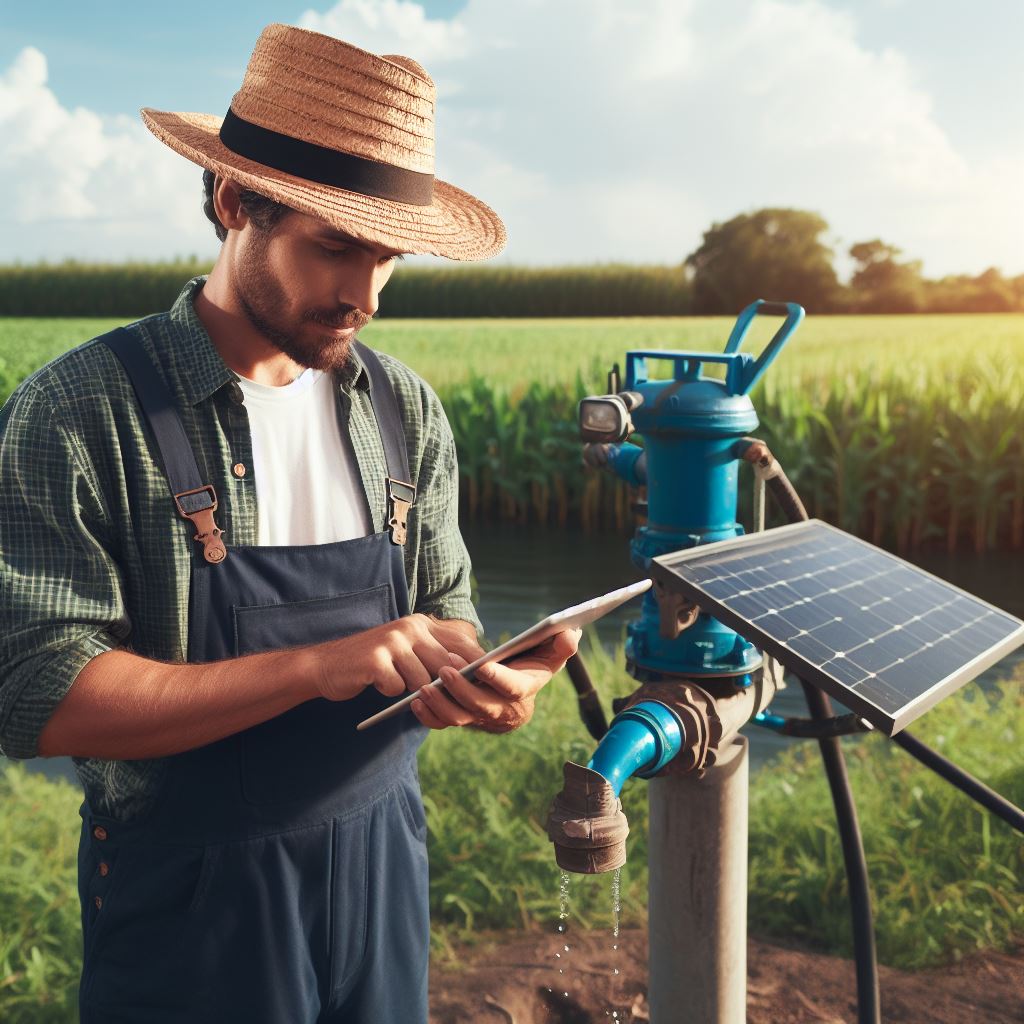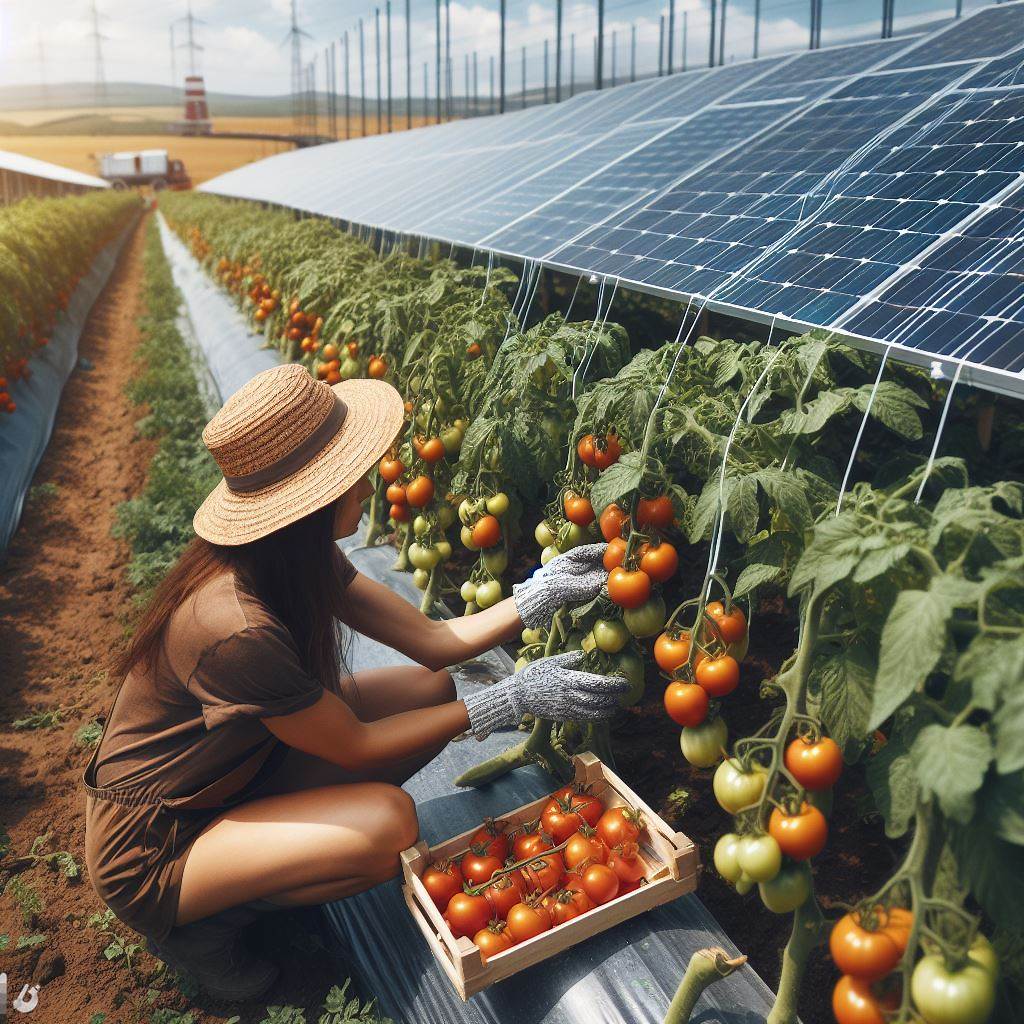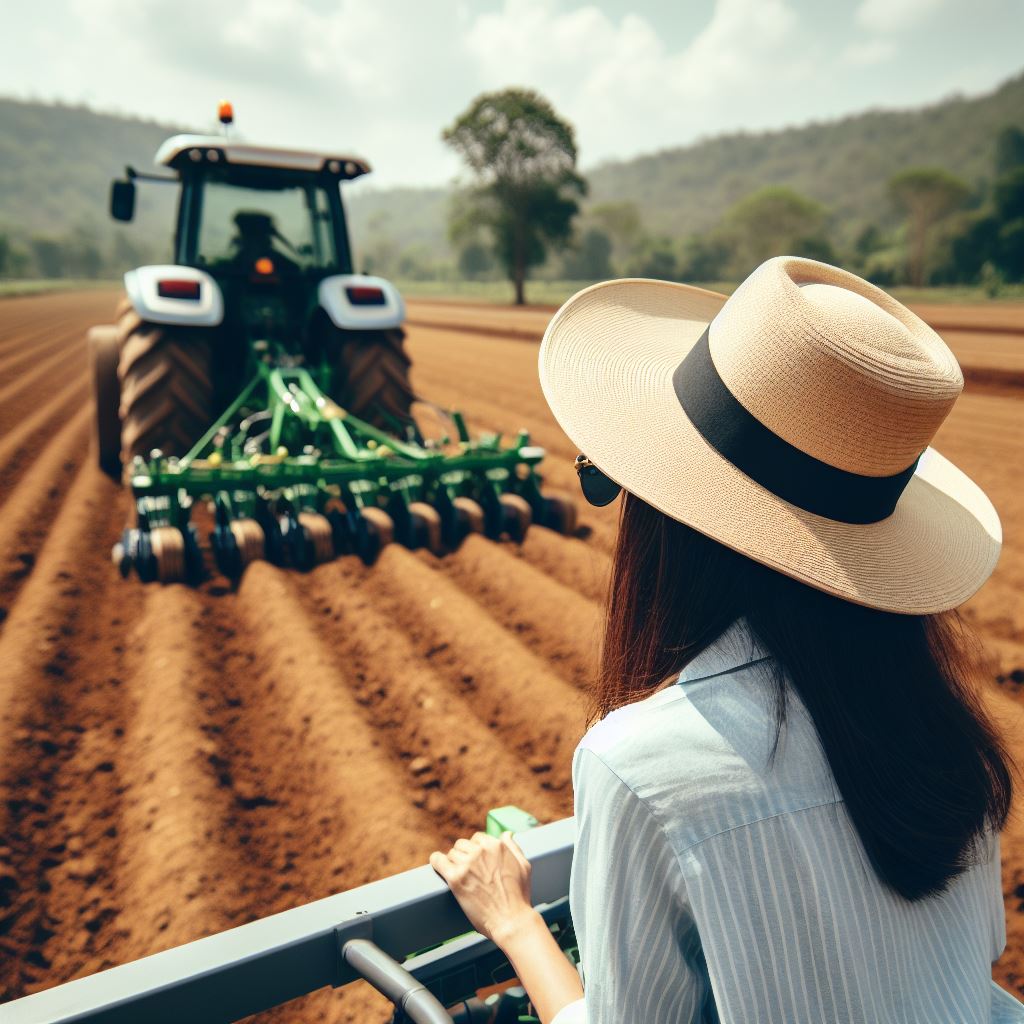Introduction
A. Brief Explanation of Sustainable Technology
Sustainable technology refers to the use of innovative solutions that minimize the environmental impact while maximizing productivity in various industries.
In agriculture, it involves implementing eco-friendly practices and utilizing advanced machinery and techniques.
B. Importance of Sustainable Tech in Agriculture
Sustainable technology plays a crucial role in agriculture for several reasons.
Firstly, it helps reduce the environmental footprint by minimizing water usage, soil erosion, and the release of harmful chemicals.
Secondly, it promotes biodiversity and protects natural habitats.
C. Transition to a New Era in Agriculture with Sustainable Tech
The integration of sustainable technology in agriculture marks the beginning of a new era.
Farmers can now rely on precision agriculture, using sensors and data analysis to optimize crop management.
This results in increased productivity, reduced costs, and higher quality produce.
Furthermore, sustainable tech paves the way for alternative farming methods like vertical farming, hydroponics, and aquaponics.
These methods enable year-round cultivation in controlled environments, reducing the need for land and water resources.
Additionally, sustainable technology fosters collaboration among farmers, researchers, and industry experts.
Sharing knowledge and insights through digital platforms enhances efficiency and encourages continuous improvement.
In general, the adoption of sustainable technology in agriculture is imperative for a more sustainable future.
With its ability to minimize the negative impact on the environment and enhance productivity, it revolutionizes the industry.
The new era in agriculture has arrived, empowering farmers to contribute towards a greener and more efficient world.
Transform Your Agribusiness
Unlock your farm's potential with expert advice tailored to your needs. Get actionable steps that drive real results.
Get StartedBenefits of Sustainable Tech in Agriculture
Advancements in sustainable technology have brought about several benefits to the agriculture industry.
These benefits can be categorized into environmental, economic, and social aspects.
A. Environmental benefits
One of the significant advantages of sustainable technology in agriculture is the reduction in chemical use.
Traditional farming practices often rely heavily on pesticides and fertilizers, which can have harmful effects on the environment.
By adopting greener alternatives such as organic farming and integrated pest management, farmers can minimize their reliance on chemicals, resulting in cleaner air, water, and soil.
Furthermore, sustainable tech promotes the preservation of natural resources.
Through advanced irrigation systems, farmers can optimize water usage, reducing waste and conserving this precious resource.
Additionally, precision farming techniques enable farmers to apply fertilizers and nutrients precisely where needed, preventing nutrient runoff and soil degradation.
Another significant environmental benefit is the mitigation of greenhouse gas emissions.
Sustainable agricultural practices, including the use of renewable energy sources, such as solar power, and the implementation of anaerobic digesters, help reduce carbon emissions.
By minimizing greenhouse gas emissions, sustainable tech in agriculture contributes to combating climate change and its adverse effects.
B. Economic benefits
Embracing sustainable technology in agriculture can lead to increased efficiency and productivity.
Advanced monitoring systems, drones, and sensors help farmers gather real-time data on crop health, soil conditions, and weather patterns.
This data-driven approach allows farmers to make informed decisions and optimize their farming methods for improved yields and profitability.
Moreover, sustainable tech offers long-term cost savings for farmers.
While initial investments in sustainable technologies might be higher, they often result in reduced operational costs over time.
For instance, incorporating energy-efficient equipment, such as drip irrigation systems and smart irrigation controllers, can significantly lower water and energy expenses.
Additionally, sustainable practices minimize the need for costly chemical inputs, making agriculture more economically sustainable in the long run.
C. Social benefits
The shift towards sustainable tech in agriculture also brings numerous social benefits, starting with healthier food production.
By reducing chemical use and promoting organic farming practices, sustainable agriculture produces safer and more nutritious food for consumers.
Consuming pesticide-free and nutrient-rich food contributes to improved public health and reduces the risks of pesticide-related illnesses.
Furthermore, the adoption of sustainable tech in agriculture leads to improved worker safety.
With the use of automation and robotics, labor-intensive tasks become less hazardous for farm workers.
Automated machines can handle repetitive or physically demanding tasks, reducing the risk of injuries and promoting a safer working environment.
Showcase Your Farming Business
Publish your professional farming services profile on our blog for a one-time fee of $200 and reach a dedicated audience of farmers and agribusiness owners.
Publish Your ProfileIn essence, sustainable tech in agriculture offers a wide range of benefits in terms of the environment, economy, and society.
By reducing chemical use, preserving natural resources, mitigating greenhouse gas emissions, increasing efficiency, and improving productivity, sustainable tech paves the way for a more sustainable and resilient agricultural sector.
Furthermore, it enables healthier food production and enhances worker safety, contributing to the overall well-being of both consumers and farm laborers.
Read: Vertical Farming: The Rise of Urban Agriculture
Examples of Sustainable Tech in Agriculture
Sustainable technology is transforming the agricultural sector, enabling more efficient and environmentally friendly practices.
This section explores several examples of sustainable tech in agriculture.
A. Precision farming
Precision farming leverages advanced technologies to optimize agricultural processes.
- Use of drones for data collection: Drones equipped with cameras and sensors can capture high-resolution images and collect data on crops, soil conditions, and nutrient levels.
- Automated irrigation systems: These systems use sensors and weather data to provide precise amounts of water to crops, reducing water waste and ensuring optimal irrigation.
B. Vertical farming
Vertical farming involves growing crops in vertically stacked layers, maximizing land use and resource efficiency.
- Indoor cultivation using hydroponics: Hydroponics allows crops to be grown in nutrient-rich water without soil, reducing water usage by up to 90% compared to traditional farming methods.
- Efficient use of space and resources: Vertical farming structures utilize vertical space, enabling higher crop yields per square foot and reducing the need for large land areas.
C. Biological pest control
Biological pest control methods focus on using natural predators to manage pests, reducing the reliance on chemical pesticides.
- Introduction of natural predators: Farmers can introduce beneficial insects, such as ladybugs or predatory mites, to control pest populations naturally.
- Reduced chemical pesticide use: By utilizing natural predators and implementing integrated pest management strategies, farmers can minimize the use of chemical pesticides, promoting a healthier ecosystem.
D. Renewable energy integration
Integrating renewable energy sources into farming operations helps reduce greenhouse gas emissions and reliance on fossil fuels.
- Solar panels for powering farming operations: Installing solar panels on farms allows for the generation of clean energy to meet power needs, reducing carbon footprint.
- Sustainable energy sources for machinery: Utilizing biofuels or electric-powered machinery decreases reliance on fossil fuels, contributing to a more sustainable and environmentally friendly agriculture sector.
In fact, sustainable technologies in agriculture have revolutionized farming practices, promoting efficiency, resource conservation, and environmental protection.
Precision farming, vertical farming, biological pest control, and renewable energy integration are just a few examples of the remarkable advances being made in this new era of sustainable agriculture.
Embracing these technologies will lead us towards a more sustainable future for both farmers and the environment.
Read: Agri Solar Panels: Powering Farms Sustainably

Challenges and Limitations of Sustainable Tech in Agriculture
The adoption of sustainable technology in agriculture brings numerous benefits, but it also comes with its own set of challenges and limitations.
Understanding and addressing these barriers is crucial to ensure the successful integration of sustainable tech in the agricultural industry.
A. Initial high costs of implementation
One of the primary challenges in adopting sustainable technologies is the significant upfront costs involved.
Investing in equipment and infrastructure required to implement sustainable practices can be financially burdensome for farmers, especially those with limited resources.
The expenses associated with purchasing and installing technologies like precision agriculture tools, solar energy systems, or advanced irrigation systems can deter many farmers from embracing sustainable solutions.
However, it’s important to note that while the initial costs may be high, the long-term benefits of sustainable technologies can outweigh the investment.
For instance, precision agricultural tools may enhance crop yields and reduce input costs over time, leading to improved profitability for farmers.
To overcome this challenge, governments and organizations can provide financial incentives, subsidies, or low-interest loans to assist farmers in adopting sustainable technologies.
B. Limitations in certain regions or crops
Sustainable technologies may not be universally applicable across all geographical regions or crop types.
Factors such as climate, soil type, and water availability can limit the efficacy and suitability of certain sustainable practices.
For example, renewable energy systems like wind turbines or solar panels might not be feasible in regions with low wind speeds or inadequate sunlight.
Similarly, some sustainable pest management methods may not be effective against specific pests prevalent in certain crops.
Developing region-specific sustainable technologies and practices can help overcome these limitations.
Robust research and development efforts are essential to tailor sustainable solutions to individual agricultural systems, ensuring their effectiveness and applicability across diverse regions and crop varieties.
C. Technological adoption barriers for farmers
While sustainable technologies offer immense potential, their adoption by farmers can be impeded by various barriers.
Lack of awareness and understanding about the benefits and availability of sustainable tech can deter farmers from considering these alternatives.
Additionally, the complexity and technicality associated with some sustainable technologies can be overwhelming for farmers, especially those with limited technical skills or education.
To overcome adoption barriers, educational initiatives and extension services should focus on raising awareness and providing necessary training to farmers.
Collaborative efforts involving agricultural experts, industry professionals, and policymakers can help bridge the knowledge gap and facilitate the adoption of sustainable technologies.
D. Need for adequate training and support
Effective implementation and optimal utilization of sustainable technologies require farmers to have adequate training and ongoing support.
Without proper understanding and guidance, farmers may struggle with the operation, maintenance, and troubleshooting of sustainable tech.
Government agencies, agricultural institutions, and private organizations should offer comprehensive training programs and technical assistance to farmers.
These initiatives can include workshops, demonstrations, online resources, and on-site support to ensure farmers have the necessary skills and knowledge to successfully integrate sustainable technologies into their farming operations.
In short, sustainable tech in agriculture brings numerous advantages, but certain challenges and limitations must be overcome for its widespread adoption.
The initial high costs of implementation can be mitigated through financial incentives and support.
Limitations in certain regions or crops require tailored solutions, and technological adoption barriers can be addressed through educational initiatives.
Showcase Your Farming Business
Publish your professional farming services profile on our blog for a one-time fee of $200 and reach a dedicated audience of farmers and agribusiness owners.
Publish Your ProfileAdequate training and support are essential to empower farmers for successful integration of sustainable technologies.
By addressing these challenges, we can usher in a new era of sustainable agriculture that benefits both the environment and farmers’ livelihoods.
Read: Hydroponics: Soil-Free Farming Tech Trends
Future Outlook and Potential Developments in Sustainable Tech
A. Advancements in artificial intelligence and automation
- Artificial intelligence (AI) and automation have the potential to transform agriculture into a more sustainable industry.
- AI can analyze data from sensors, satellites, and drones to make more informed decisions regarding crop management.
- Automation can reduce the need for manual labor, leading to increased efficiency and reduced carbon footprint.
- Robotic technology can perform tasks such as planting, harvesting, and pest control with precision and minimal environmental impact.
- With AI and automation, farmers can optimize resource allocation, minimize waste, and improve overall productivity.
B. Integration of Internet of Things (IoT) in farming operations
- IoT refers to the interconnected network of devices that can collect and exchange data through the internet.
- In agriculture, IoT can enable real-time monitoring of soil moisture, temperature, and nutrient levels.
- Farmers can receive alerts and make data-driven decisions to ensure optimal crop growth and minimize water and fertilizer usage.
- IoT also allows for remote control of irrigation systems, reducing water wastage and improving water management practices.
- The integration of IoT in farming operations leads to more precise and sustainable farming practices.
C. Biotechnology innovations for sustainable crop production
- Biotechnology offers promising solutions for sustainable crop production through genetic modification.
- Genetically modified organisms (GMOs) can be engineered to resist pests, diseases, and drought.
- GMOs can reduce the need for chemical pesticides and herbicides, resulting in less environmental pollution.
- Biotechnology also enables the development of crops with improved nutritional content, addressing malnutrition and food security.
- Continued research and development in biotechnology can lead to even more sustainable and resilient crop varieties.
D. Collaborative efforts and research for continuous improvement
- To achieve sustainable tech in agriculture, collaboration between industry stakeholders and research institutions is crucial.
- Governments, farmers, technology companies, and scientists need to work together to share knowledge and resources.
- Collaborative efforts can accelerate the development and adoption of sustainable technologies, leading to widespread change.
- Continued research is necessary to address challenges and refine existing sustainable tech solutions.
- Investments in research and development can drive innovation and ensure continuous improvement in sustainable tech for agriculture.
Overall, the future outlook for sustainable tech in agriculture is promising.
Advancements in artificial intelligence, automation, IoT, and biotechnology offer immense potential.
Collaborative efforts and continuous research can further enhance the development and adoption of sustainable tech.
By embracing these innovations, farmers can increase productivity, reduce environmental impact, and ensure food security for future generations.
Read: Agri-Drones: Changing the Face of Farming
Conclusion
A. Importance and Benefits of Sustainable Tech in Agriculture
Sustainable tech revolutionizes farming, enhancing efficiency, reducing environmental impact, and ensuring long-term food security. Embracing these innovations is key.
B. Encouragement for Farmers
To farmers, the call is clear: adopt sustainable tech. Embrace precision agriculture, smart irrigation, and AI-driven insights for a thriving farm.
C. Excitement for the Future
The future of agriculture gleams with promise as sustainable technology reshapes farming landscapes.
Let’s usher in this new era together, cultivating a sustainable, tech-driven tomorrow.




